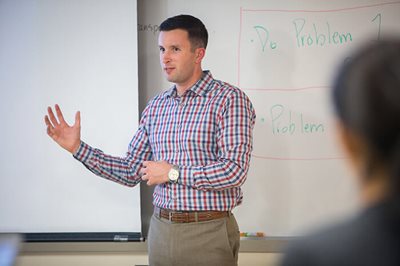Elevating His Career
 Michael Catalano
Michael Catalano
Industrial Engineering Superintendent, Boeing
Michael Catalano was working as an engineer for Boeing’s 777 commercial jet program when he decided to steer his career toward a new heading.
Mike’s undergraduate degree in industrial engineering had given him a solid foundation in industrial and system processes, but he was looking for a more diversified skillset to continue growing in the aerospace industry.
“I wanted to expose myself to different parts of business, to really expand the scope of my understanding of core operations,” said Mike, who graduated in 2015.
So he chose to enroll in the online Master of Supply Chain Transportation & Logistics. Within a year, Mike was promoted to a new managerial position, thanks to the knowledge and skills he learned in the program.
Why did you decide to go back and get your master’s degree in this program?
I toyed with idea of going back for an MBA, but decided to move toward a supply chain degree instead. It seemed more relevant to my career track: interacting with upstream and downstream businesses, the transportation of goods — the kinds of things I didn’t have much exposure to.
Were you able to keep up in your current job while completing your degree?
Yes. Obviously you're pretty busy when you're in the program, but it's definitely doable. The flexibility of the online class was good, because it allowed me to still have a social life. Plus, I tend to work across multiple shifts to support production in my job, so I loved having that flexibility.
How did you connect with other students in your cohort?
The Residency really helped me meet people, and it was also pretty easy to meet up with your group during the year. It might be an online setting, or the faculty would invite us to social events with new cohorts and advisory board members. Stuff like that happened throughout the year. I gained a lot of knowledge from my classmates — there were other Boeing folks, but also people from companies like Tesla, T-Mobile and REI.

What did the faculty bring to the program?
I really appreciated the diverse knowledge the faculty had. You have professors from different departments at the UW who have also worked in corporate settings. The amount of real-life experience they had, combined with their backgrounds in academia, was awesome.
How did the knowledge you developed benefit your career?
I found a lot of the curriculum really relevant and translatable to my work. For example, my first class was about information technology systems and the differing methods and systems companies use to compile data, turn it into meaningful information and communicate with each other. That was relevant because we use a ton of data in the work I do. To have a clear understanding of how all the data connects from a systems perspective, and to understand where the gaps can be, proved to be incredibly useful.
Did being in this program help lead to a better job?
Yes, about a year into the program I was given the opportunity to take a management role in industrial engineering. The knowledge I gained from the program was definitely a catalyst for my career development and increased my confidence as a leader. I felt comfortable working with managers from various functional groups, and making decisions that impacted our product’s value stream and bottom line, because I had a strong understanding of the potential risks and benefits.
Would you recommend the Master in Supply Chain Transportation & Logistics to other professionals?
Absolutely. I think it gave me a really well-rounded perspective of how businesses function, and at a much higher and broader level than in my undergraduate experience. And the fact that you’re working while you’re doing it makes it much easier to put what you learn into practice, and to understand it and retain it.